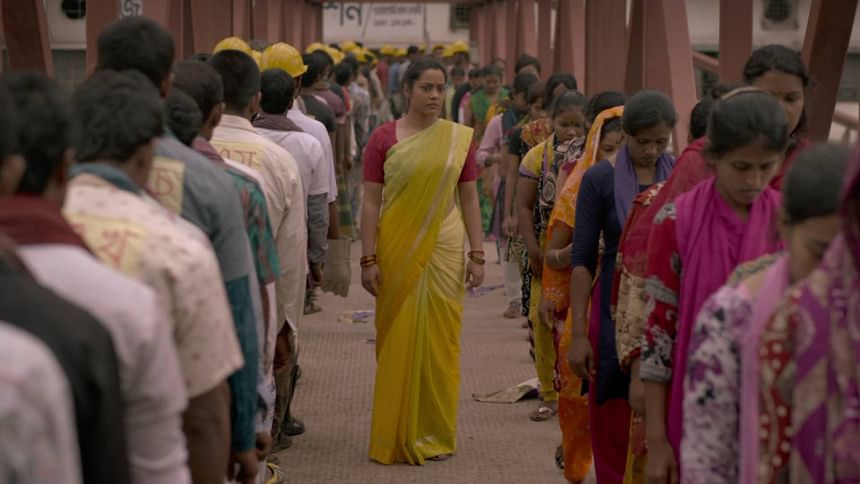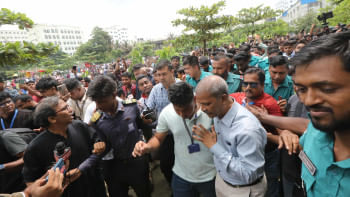The portrayal of women in films: Are we open to discussions?

I clearly remember that it was a Monday morning, while holding a cup of tea in my hand, that I learned about the term 'male gaze'. It started with me reading a 90's comic strip, about the character "Darla", where she is discussing the Bechdel Test with her best friend.
Intrigued by this test that I had never heard of before, I took to Google to find the answers. Within a few minutes, I had learned that the Bechdel-Wallace test is a measurement to assess the intellectual depth of fictional women. The requirements to pass the test were: the work of fiction should have at least two women in it, who talk to each other about something other than a man.
Thinking about the test, I realised that many of the movies and shows that I had come to love did not actually pass the Bechdel Test. Upon further Google searches, I learned about the term 'male gaze'.
The term was coined in 1975 by film theorist Laura Melvey for her essay 'Visual Pleasure and narrative Cinema'. To put it simply, the male gaze entails looking at the opposite sex or any gender through a binary viewpoint, with a lack of dimension and only for enjoyment. Melvey also mentions that this phenomenon was historical, as men have had control over what they want to see, as they were predominantly the creators of visual arts in the early days. This is especially true in the case of Bangladesh, as only a few Google searches will show just how few the number of female filmmakers is in our country's mainstream media.
Recently, I had the pleasure of attending the 4th edition of the Samabhav Traveling film Festival. The festival was held in celebration of gender diversity and inclusion, featuring films and discussions on gender, sexuality, masculinity and relationships. The event took place in Dhaka from August 21-22, with Sangat- A Feminist Network, One Billion Rising Bangladesh, the department of Women and Gender studies from the University of Dhaka and BRAC James P Grant School of Public Health being the organising partners in Bangladesh.
The festival featured 20 films from various directors, along with sessions for discussion in-between. Among these directors were Bangladeshi creators like Rubaiyat Hossain, Mostofa Sarwar Farooki and Bangladeshi-born Zana Shammi.
This traveling festival left an impression on me that I find quite difficult to put into words. Having arrived late due to the Dhaka traffic, I missed out on the opening monologues. I was fortunate enough to catch Harish Sadani's, co-founder of Men Against Violence, discussion on toxic masculinity. Here, he talked about the importance of men having healthy conversations among themselves and using male privilege to call out the wrong doings in our society.

The festival was held in the memory of Kamla Bhasin, a noted feminist and founder of Sangat, who sadly passed away last year. She envisioned a South Asia with no borders and loved the idea of a travelling film festival, going to neighbouring countries, helping women to feel they are not alone in their suffering, and inspiring the idea of communal solutions. Kamla believed that creative mediums can bring about the change that we so direly need in order to ensure equality.
Rubaiyat Hossain's film "Under the Construction", was also screened at the event. The movie follows the story a middle-aged girl, who fights against society's imposition of certain values on women. The brilliance of Hossain's cinematography truly demystifies the 'womanly' experience into a teeth-grinding and palate expanding vigour. The experience of having to fit yourself into a box, modifying your sense of self and the pain of it, was beautifully portrayed in the film.
After the screening of the movie, the festival goers sat in on a discussion regarding the male gaze.
When asked what defines the 'gaze' of a woman, Shameem Akhtar, a prominent filmmaker, answered that the female perspective entails raising your voice about things that aren't talked about, holding up the invisible parts of our life with honesty.
Adding to this, Taslima Akhter, an activist and photographer, broke down the male gaze in terms of photography during the Liberation war, and how majority of the photos we see of women in the war show them cooking or feeding individuals, as the only photographers present were men.

"In those photos, subjects can be seen fulfilling roles that are usually deemed 'womanly' activities. Did women not fight in the war as well?" asked Akhter.
Following this, we got to see Zana Shammi's "Untying the knot", being screened for the first time in Bangladesh. The docufilm follows the lives of four women and the trauma that follows them as victims of domestic abuse. Majority of these victims were subjected to marital domestic violence, and they shared their experiences regarding it. The film goes to great lengths to capture the extent of abuse faced by the victims, never once flinching away from showing it in its teeth-baring viciousness.
There were countless moments that left the audience gasping, followed by the entire auditorium sitting in shocked silence.
Following the film, another discussion panel, headed by Sara Hossain, Barrister at Supreme Court of Bangladesh and Honorary Director of BLAST.
The discussion also included one of the women from the docufilm, where she got to speak with Sara Hossain about her experience. She talked about her life after the film and the lessons she took away from the experience.

When discussing why women rarely seek divorce, Sara Hossain highlighted the degradation a woman must go through to get a divorce. She spoke about the need for self-independence and respect when escaping from a situation of domestic violence.
On the Bangladeshi silver screen, we are yet to see such films, where individuals from any or every background can come forward to tell their stories. Film festivals like Samabhav serve as a congregation of like-minds and a platform to paint stories, no matter how personal.
This is a perspective that needs to be welcomed onto the big screens, along with creators who are willing to write and direct such stories. As much as there is a need for commercial content to keep the industry alive, there also exists a need for stories to pass on.

 For all latest news, follow The Daily Star's Google News channel.
For all latest news, follow The Daily Star's Google News channel. 






Comments